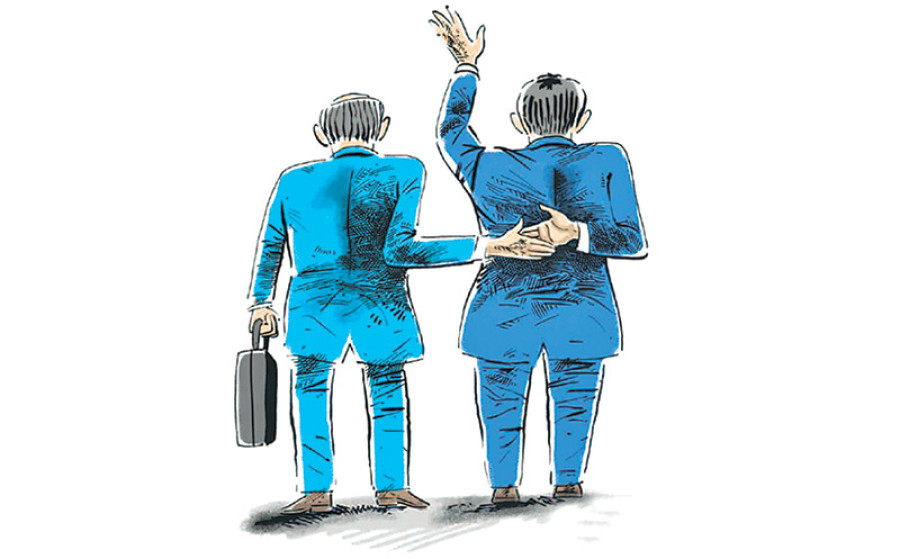Opinion
Money, muscle and politics
The recent nomination of candidates and the alignment of different political parties are based on power equations rather than ideology.
Bigyan Prasai
The recent nomination of candidates and the alignment of different political parties are based on power equations rather than ideology. Political parties have, by and large, been influenced by money and muscle in the candidate selection process. Political values seem to be moving in the direction of anarchism, patronagism, racism, individualism and egoism. Despite huge opportunities and abundant natural resources, Nepal has not been able to move ahead towards national wellbeing and development. A small mistake by a leader has a huge impact on national development and welfare. The nexus of money, muscle and politics is increasingly gaining momentum.
Shady affair
The capture of state resources by political parties has been the norm. Moral values degraded to the point where money and muscle were seen as social credentials. Prejudicial justice, weak government institutions and lack of social safety nets are the result of unstable governments which has created a fertile ground for people with money and muscle, and now, even people with a criminal background. The major political parties, the Nepali Congress (NC), CPN-UML and Maoist Centre, have not hesitated to give election tickets to people with a criminal past.
Ideological slogans have become mere political propaganda to capture and influence voters. There is not much difference in terms of ideology between liberal democracy and capitalism-socialism for Nepal’s political parties. The common theme is gaining power and privilege to acquire state resources, remain in power and maintain the status quo. The country is trapped in a vicious circle of vested interests of the political and social elite, which has now spread to the lower spectrum of society. The vested interests have its roots in corruption of a multifaceted dimension. The power of money has gained influence to get a hold on politics. It is unfortunate that a large number of people and supporters follow, with garlands, to welcome leaders that have a corrupt and criminal mentality.
Election campaigns have become very costly, and it is a fact that elections cannot be won without money. Money is required to run the campaign, but the influence of large donors has to be mitigated in the political process. Sources of donations have to be transparent and accountable. Political parties have to be responsible and accountable for all the money raised, and their book of accounts should be audited after the completion of the election by an independent auditor. Unidentified sources have to be investigated and brought under the financial framework. As long as poverty prevails, the current money-criminal political nexus is not going to change.
The need for money and muscle, that has been gaining momentum, needs to be looked into seriously by political analysts, policymakers and civil society. The rise of money and muscle in politics means weak public institutions and leaders only interested in gaining and remaining in power. This clearly shows that voters in poor countries look for immediate and short-term rewards which are made available by bad strongman politicians who have the credentials and ability to provide them by using resources acquired by illegitimate means.
End the culture of patronage
We need to think seriously that national politics should not be trapped by the crime-money-politics nexus. Costly elections, deep social gaps, weak rule of law and immoral political leaders are the critical drivers of criminality and money influence in politics. Because of these factors, poor voters look for a local guardian who is the bad strongman with money and powerful connections. This patronage political culture will not go away until strong government institutions are built. As long as the patron-client relationship remains in our society, the money will smell.
The problem in Nepal is that the ordinary people too need political patronage to sustain lengthy and successful careers, especially if they work in the public sector. People are divided into different political organisations according to needs and linkages rather than political ideology. As long as this politics of patronage exists, political institutions will not develop to strengthen democracy. The leaders at the top do not want this to change due to the fear of losing their authority and power. A radical transformation of political parties is a must if Nepal is to sustain democracy and development.
Such a transformation will not come from the top. A bottom-up approach is required, and youths with vision and commitment should lead this process of transformation. Transformation of all political parties is the necessity of today’s Nepal to revive the practice of democracy. Reforms in political parties are a must in multiparty democracy which is the foundation of parliamentary democracy. The government has to be stable, and this means that it has the resources and capacity to execute its core functions to provide public services impartially. It should be able to provide basic security and dispense justice. In addition, it is a must to prevent illicit money in election campaigns by passing strict electoral laws and religiously implementing them.
Prasai is pursuing a Master’s in public policy, SOAS, University of London




 18.12°C Kathmandu
18.12°C Kathmandu










